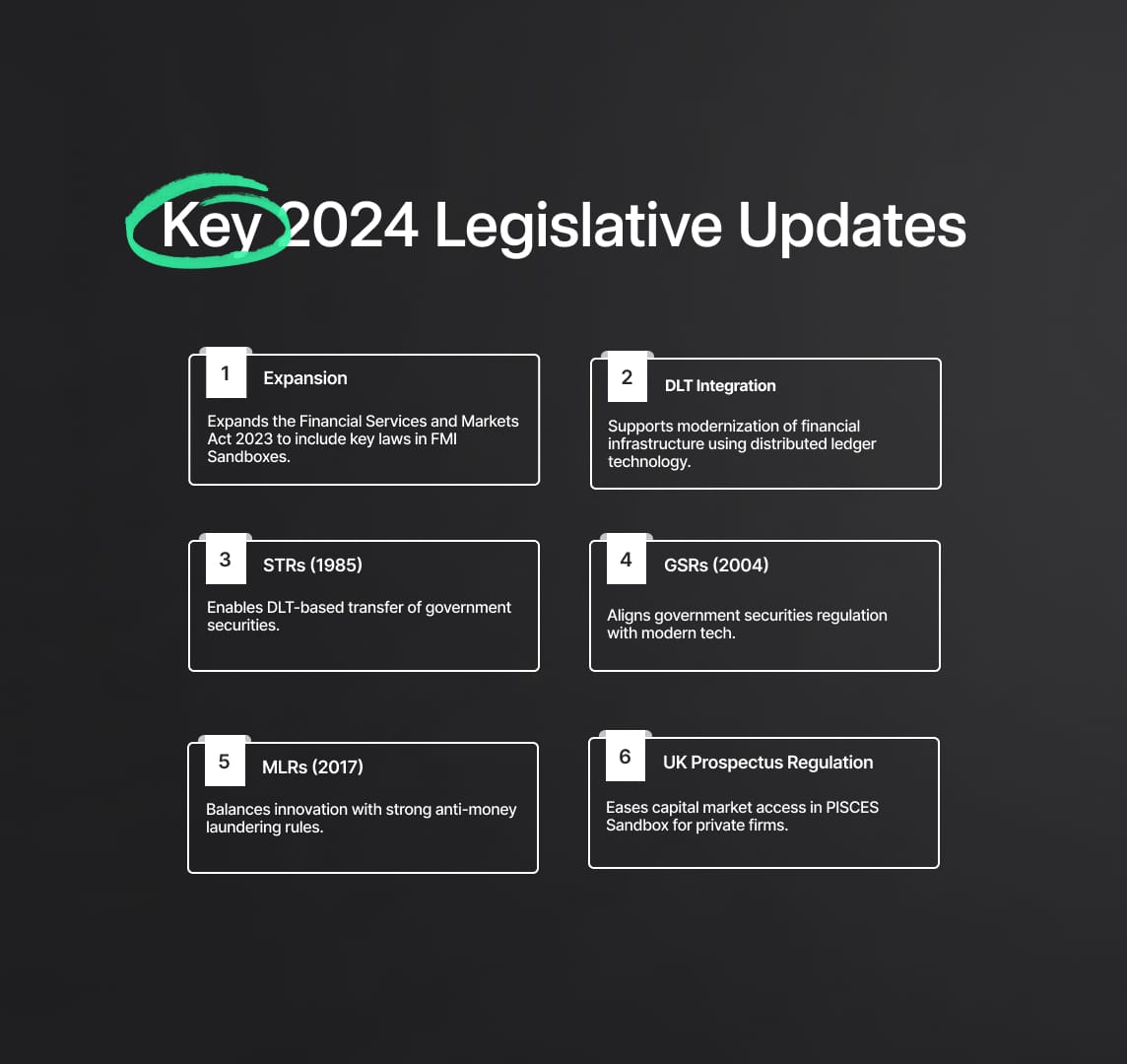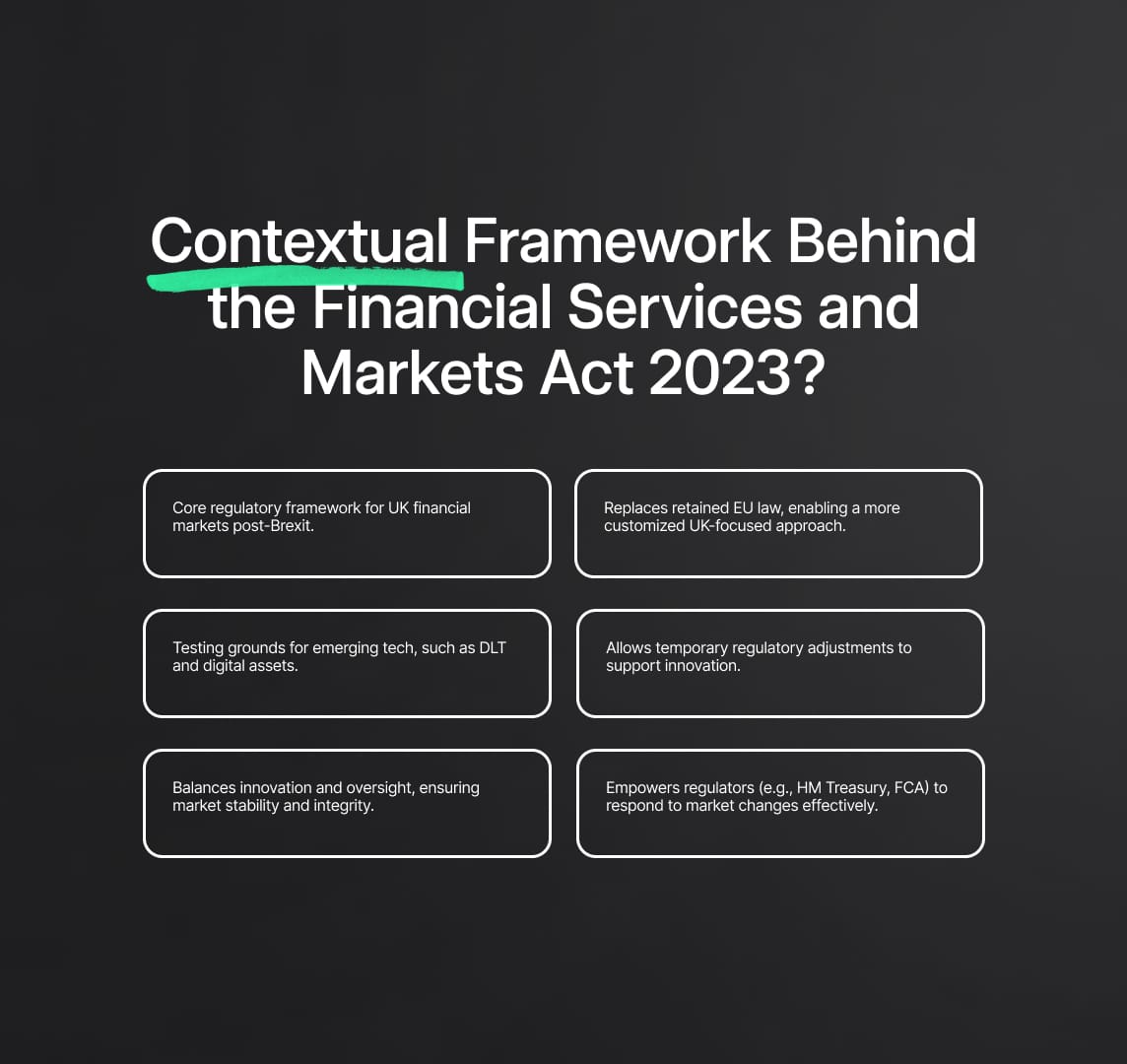Financial Services and Markets Act: FMI Sandboxes and DLT Integration
HM Treasury's 2024 amendments to the Financial Services and Markets Act 2023 introduce FMI Sandboxes, promoting the integration of DLT and digital assets, enhancing regulatory flexibility, and fostering innovation in the UK’s financial markets.

On October 31, 2024, HM Treasury introduced pivotal amendments to the Financial Services and Markets Act 2023 (FSMA 2023) through the draft Financial Services and Markets Act 2023 (Addition of Relevant Enactments) Regulations 2024. These changes, aimed at enhancing the UK's financial market infrastructure, were published with the intent to drive innovation and regulatory adaptability. This marks a significant step in the evolution of financial regulations under FSMA 2023, reflecting the government's commitment to fostering a more flexible and forward-looking financial ecosystem.
Source
[1]

Key Legislative Updates You Need to Know
The 2024 regulations expand the scope of the Financial Services and Markets Act 2023 by incorporating several key enactments into its framework, enabling the Treasury to apply, modify, or disapply these laws within Financial Market Infrastructure (FMI) Sandboxes. The enactments include:
- Stock Transfer (Gilt-edged Securities) Regulations 1985 (STRs): Facilitates the transfer of government securities, essential for the modernization of the securities settlement systems using DLT.
- Government Stock Regulations 2004 (GSRs): Provides regulatory oversight for government securities, aligning them with modern technological frameworks within sandboxes.
- Money Laundering, Terrorist Financing, and Transfer of Funds Regulations 2017 (MLRs): Adjustments here allow firms to innovate while maintaining stringent anti-money laundering (AML) standards.
- UK Prospectus Regulation (EU Regulation 2017/1129): Critical for the PISCES Sandbox, this facilitates smoother entry for private companies into capital markets by adapting prospectus requirements for innovative financial instruments.
These changes are set to foster the development and integration of distributed ledger technology (DLT) within traditional financial market infrastructures, marking a substantial shift in how financial services operate and innovate within the UK.

FMI Sandboxes: A Catalyst for Innovation
Digital Securities Sandbox (DSS)
The DSS is a critical component of the Financial Services and Markets Act 2023 framework. By temporarily modifying legislative requirements, it allows firms to test technologies like DLT for securities settlement and trading operations. The sandbox structure provides a controlled environment to evaluate innovations that might otherwise be hindered by existing legal and regulatory constraints.
Within the DSS, firms can trial the use of DLT in managing notary, settlement, and maintenance functions of central securities depositories. This allows for seamless integration of digital assets into the securities trading ecosystem, enhancing efficiency, transparency, and security. Participants benefit from a tailored regulatory environment that mitigates risks associated with technological experimentation while promoting innovation.
Private Intermittent Securities and Capital Exchange System (PISCES) Sandbox
This sandbox facilitates intermittent trading of private company shares on a multilateral platform. It aims to streamline legal barriers, particularly in the prospectus regime, ensuring regulations are conducive to innovative trading models. PISCES will enable smaller firms and startups to access capital markets more efficiently, by modifying existing legal structures that currently act as a barrier to entry. By enabling periodic trading and easing the compliance burden, PISCES aims to democratize access to capital for private companies.
What is the Contextual Framework Behind the Financial Services and Markets Act 2023?
To fully understand the impact of these amendments, it’s essential to revisit the foundational elements of the Financial Services and Markets Act 2023. The Financial Services and Markets Act 2023 is a cornerstone of the UK's regulatory framework for financial markets. Designed to ensure robust oversight and adaptability, FSMA 2023 empowers regulators like HM Treasury and the Financial Conduct Authority (FCA) to implement critical changes in response to evolving market dynamics. This Act replaced much of the UK's reliance on retained EU law post-Brexit, ensuring a tailored approach to regulation that aligns with domestic priorities and global financial trends.
One of its most innovative aspects is the provision for Financial Market Infrastructure (FMI) Sandboxes, which serve as testing grounds for emerging technologies such as distributed ledger technology (DLT) and digital assets. These sandboxes allow temporary modifications to existing regulations, providing firms with the flexibility to innovate while maintaining regulatory oversight. By enabling a controlled environment, the Act fosters the growth of novel financial solutions without compromising the stability and integrity of financial markets.

What Future Changes Will the FSMA 2023 Amendments Bring?
The amendments to the Financial Services and Markets Act 2023 (FSMA 2023) are set to bring transformative changes to the UK's financial services landscape, driving innovation, enhancing regulatory flexibility, and shaping long-term legislative reforms.
The inclusion of Distributed Ledger Technology (DLT) and digital asset management in Financial Market Infrastructure (FMI) Sandboxes marks a significant shift in how financial transactions are recorded, verified, and settled. The Digital Securities Sandbox (DSS) specifically aims to test the integration of DLT within central securities depositories, potentially reshaping the efficiency of these systems. DLT’s potential to enhance transparency, reduce operational risks, and streamline settlement processes aligns with the broader goal of modernizing financial infrastructure.
For instance, the integration of DLT could significantly reduce settlement times from days to mere seconds, transforming the efficiency of financial markets. Additionally, the immutable nature of blockchain records enhances trust and security, which are paramount in financial transactions.
Regulatory Flexibility
The ability of HM Treasury to dynamically modify or suspend certain regulations fosters a flexible regulatory environment. This adaptability is crucial for responding to rapid technological advancements and ensuring the UK's financial market infrastructure remains competitive globally. Real-time regulatory adjustments within the FMI Sandboxes enable HM Treasury to quickly address emerging risks and opportunities, keeping the UK at the forefront of financial innovation.
Cryptoassets and Regulatory Exemptions
Temporary exemptions from the cryptoasset regime within the DSS are designed to lower entry barriers, encouraging participation and innovation in digital asset markets while maintaining broader regulatory objectives. These exemptions are carefully calibrated to balance innovation with the integrity of the financial system.
For example, firms within the DSS can experiment with novel uses of cryptoassets without the full regulatory compliance burden that applies outside the sandbox. This controlled flexibility ensures that lessons learned can be applied to future permanent regulations, making them both robust and conducive to innovation.
Long-term Legislative Reforms
The iterative feedback from sandbox trials will likely inform permanent legislative changes. These outcomes will guide the refinement of the FSMA 2023 framework, ensuring it aligns with technological advancements and evolving market needs. For instance, if the DSS demonstrates that DLT can be reliably used for securities settlement, this may lead to broader legislative reforms that embed DLT as a standard component of financial market operations.
Accelerating Innovation
By enabling FMI Sandboxes like DSS and the Private Intermittent Securities and Capital Exchange System (PISCES), the legislation supports the seamless integration of advanced technologies, including DLT and digital assets, into traditional financial systems. This fosters ongoing innovation while maintaining regulatory oversight, ensuring the UK remains a leader in global financial services.
Enhancing Regulatory Agility
The capacity to modify, apply, or suspend regulations dynamically ensures that the UK can swiftly adapt to new technological advancements and market conditions. This agility is key to maintaining the UK's competitive edge in the rapidly evolving financial landscape.

In summary, the amendments to FSMA 2023 are not only designed to strengthen the existing financial infrastructure but also to set the stage for future advancements. By fostering innovation, flexibility, and adaptability, the FSMA 2023 amendments position the UK as a leader in modern financial regulation, ready to navigate and shape the global financial landscape.
Reduce your
compliance risks


